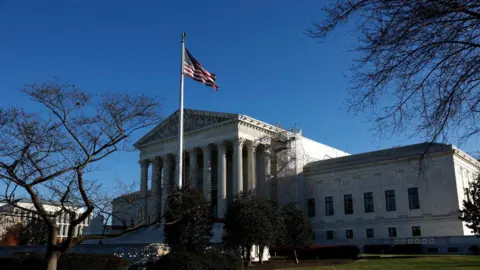Supreme Court reluctant to overturn Tennessee transgender law
 Getty Images
Getty ImagesA majority of US Supreme Court justices appear reluctant to lift Tennessee's ban on hormone therapy and puberty blockers for children under 18.
The high court heard arguments about the transgender law on Wednesday and its decision, expected next year, could impact similar laws in 25 other states.
Three Tennessee transgender teenagers, their parents and a doctor have argued that the 2023 ban violates a US constitutional guarantee of equal protection, saying it discriminates based on sex.
The hearing was the first time that the current court, which has a conservative majority, openly discussed a significant battle in the US "culture wars".
The Biden administration and US medical groups argue that the law prohibits transgender individuals from accessing drugs and therapies that are available to other adolescents with medical need. They also say it hinders parents' rights to seek needed care for their children.
During hours of oral arguments on Wednesday, five of the Supreme Court's nine justices expressed doubts on the legal challenge to the ban and the arguments made by lawyers for the families and the administration.
- BMA takes 'neutral position' on gender review
- Gender care review disappointing, says trans man
- Three trans journeys: 'I spent so long hiding'
Chief Justice John Roberts questioned whether judges should decide what he described as a medical issue - saying such questions are traditionally left up to state lawmakers.
"The constitution leaves that question to the people's representatives, rather than to nine people, none of whom is a doctor," he said.
The court's three liberal justices appeared to be firmly on the side of the Tennessee families.
Justice Ketanji Brown Jackson, compared the law to legislation prohibiting interracial marriages that was struck down in the 1960s.
"The laws here operate in the same way," she said. "The question of 'can you marry this other person' depended upon what your race was."
"I take your law to be doing basically the same thing," she added.
Tennessee's solicitor general, J Matthew Rice, pushed back and repeatedly argued that the law does not discriminate based on gender.
Mr Rice argued that the law is designed "to protect minors from risky, unproven medical interventions".
In 2020, the Supreme Court ruled that federal law prohibits discrimination against transgender employees.
Earlier this year, the court also upheld an Idaho ban against transgender medical treatments involving children, but it did not express an opinion on the constitutionality of the statute.
